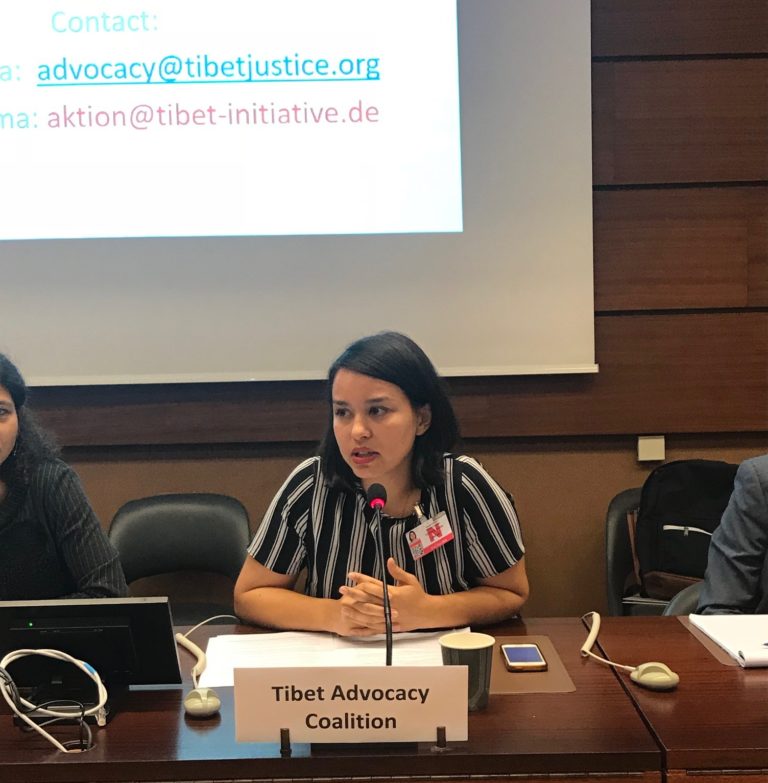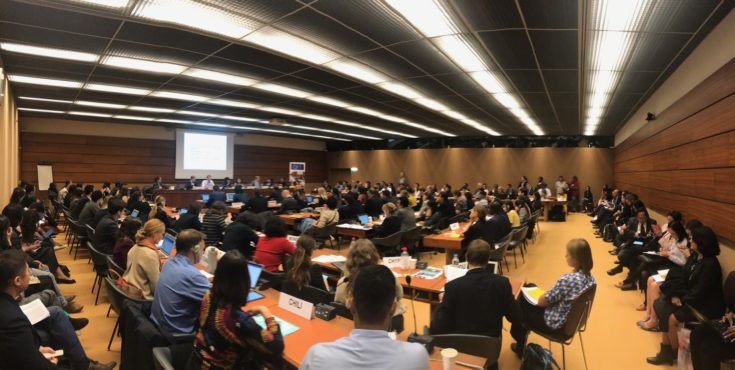Civil rights groups from across the world have begun taking action ahead of China’s third Universal Periodic Review(UPR) which is due to take place in Geneva on November 6. The groups are highlighting the Asian superpower’s continuous criminalisation and intimidation of its human rights defenders, particularly in Lhasa and other parts of the China-occupied Tibet region.
China had last undergone a UPR in October 2013, participating in dialogue and debate with the representatives of 137 United Nations member nations. At the end of the review, a list of 252 recommendations spanning economic, cultural and social rights as well as non-derogable rights such as freedom from torture had been put forth by the member nations – of which China accepted 204 and rejected 48.

Padma Dolma, Representing Tibet Advocacy Coalition. Photo: UPR
However, the promise to implement those recommendations remains unfulfilled, with further deterioration of human rights being reported in China, the Tibet Advocacy coalition has found in its assessment report. Speaking at the UPR pre-session held in Geneva on October 10, Padma Dolma of the Tibet Advocacy coalition said, “China has intensified its stringent policies in Tibet, implementing new security measures that focus solely on controlling and violating Tibetan people, rather than protecting their rights.”
Dolma also recalled that China had in the 2013 UPR accepted the recommendation to facilitate the visit of UN human rights officials, including the high commissioner, to Tibetan and Uighur areas— but has not kept this promise— a fact that had been brought up by the outgoing High commissioner himself at the UN Human Rights Council’s 38th session in June this year. Pointing out that China had accumulated over 15 pending requests for visits from UN officials since 2014, Prince ZeidRa’ad al-Hussein said, “Despite repeated efforts to visit China and establish conditions essential for an effective dialogue, my staff has not been given unfettered access to the country, especially to the Tibet autonomous region where the human rights situation is fast deteriorating.” In his final address to the HRC, he called on UN member nations to take a stronger stand against the human rights abuses by the Chinese government at the third cycle of China’s UPR. Prince Zeid had also reported that his office had been regularly receiving “urgent appeals regarding arbitrary detentions, enforced disappearances, ill-treatment and discrimination against various groups including human rights defenders, lawyers, legislators, book sellers and members of communities such as Tibetans and Uyghurs.”
The 31st session of the UPR is slated to be held from October 31 onwards and the two-week session will cover 12 countries, including Saudi Arabia, Malaysia and Mexico among others. China’s review is scheduled for November 6, and the troika nations that will collate the questions and suggestions raised by the rest of the UN members countries and act as China’s rapporteurs at the three-and-a-half-hour-long session are Kenya, Hungary and Saudi Arabia. The report will be released on November 8.
UPR FACT SHEET
The Universal Periodic Review (UPR) is a process established by the Geneva-based UN Human Rights Council (HRC), under which the human rights record of each of the UN’s 193 member countries is peer-reviewed every four or five years.
Under the UPR, every country has the opportunity to make recommendations on every other country’s human rights record. The first UPR took place in 2008, the second in 2012, and the third is ongoing.
For each individual UPR, three countries, known as the “troika,” are selected by the drawing of lots among Human Rights Council members to assist the Working Group and to coordinate the writing of the outcome report.
Three documents form the basis of the UPR: a national report submitted by the state under review, a compilation of UN information by the Office of the High Commissioner for Human Rights (OHCHR), and a summary, also prepared by the OHCHR, of reports submitted by non-government organisations and other stakeholders. To further promote civil society participation, each government under review is encouraged to broadly consult with domestic civil society when preparing its national report.
The core component of the UPR is an interactive dialogue between the state under review and all UN member states that wish to participate by posing questions, giving comments, or making recommendations.
Following the dialogue, but prior to the formal adoption of the outcome report, the state under review must indicate whether it accepts, rejects, is already implementing, or needs to further consider each recommendation advanced by member states.
Finally, at a Human Rights Council session, the outcome report is adopted as the formal record outlining the results of the review, including the member state’s dispositions regarding the recommendations. The state’s implementation of accepted recommendations will then be incorporated into the next cycle of UPR.

Diplomats and Civil Society Organisations at the Pre-session on China. Photo: UPR Info




 Print
Print Email
Email